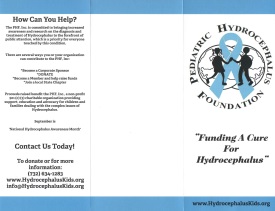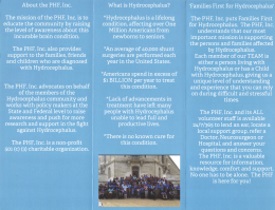N. Cape May mom fights for funds, awareness for hydrocephalus
August 15, 2012 by PHF
Filed under Uncategorized
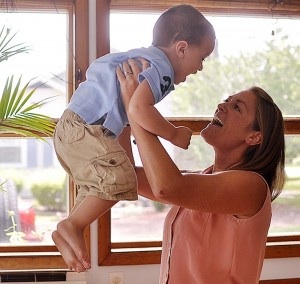 Look at 2-year-old Brody Bove, of North Cape May, and you will see a precocious, active little boy. You also will see many scars and stitch marks on his head, the result of four brain surgeries to control an incurable condition called hydrocephalus.
Look at 2-year-old Brody Bove, of North Cape May, and you will see a precocious, active little boy. You also will see many scars and stitch marks on his head, the result of four brain surgeries to control an incurable condition called hydrocephalus.
Affecting one in 500 children, hydrocephalus is a condition in which excessive fluid gathers in the brain, abnormally widening the spaces in the brain and placing potentially harmful pressure on brain tissues.
Many of those affected cannot lead full and productive lives – and untreated, hydrocephalus can be fatal.
In May, Brody’s mother, Madonna Logue Bove, became the Southern New Jersey/ Philadelphia chapter director of the Pediatric Hydrocephalus Foundation. Her goal is to raise awareness of the condition and to raise funds for medical research.
Brody’s story began when he was 18 months old.
“Brody had flulike symptoms. He was vomiting a lot,” Logue Bove said. “The next day his balance was off and his eyes were like bulging out of his head. We took him to the local hospital’s emergency room, where they treated him for dehydration, which has many of the same symptoms as hydrocephalus. Brody didn’t react to the treatment and was admitted. Luckily, someone that was familiar with hydrocephalus was able to examine him and thought there was a need for a CAT scan.”
The scan showed fluid on the brain, and Brody’s doctor wanted to send him to St. Christopher’s Hospital in Philadelphia for immediate surgery. But, he was afraid Brody would not survive the ride.
“I was just freaking out this whole time,” Logue Bove said. “I had no idea what hydrocephalus was. I was so scared.”
Brody’s doctor made some phone calls, and finally found a neurosurgeon in Atlantic City who agreed to perform surgery. An external catheter was put in Brody’s brain to drain the fluid and relieve the pressure on his brain. Brody was taken to St. Christopher’s, where a shunt was put inside his brain with a tube that runs down his neck to his stomach. The shunt diverts the excess fluid to Brody’s stomach, where it can be drained out.
“What makes the condition so bad is that it is a lifelong condition,” Logue Bove said. “As the child grows, a new shunt has to be put in. Right now, if all goes well, Brody won’t need surgery again until he is 8. But there can be many complications. Brody had to have surgery after an infection, and there can be other complications as well. It’s hard because you really never know when something will happen and he will need surgery. Through this whole ordeal, Brody has been a terrific kid. He was so well behaved. He had to be restrained because he tried to pull out the external catheter. But once the shunt was in, he was fine. He just seems to take everything into stride.”
Brody’s condition may have caused some developmental delays, and Logue Bove is going to have him evaluated soon, she said.
“His eating habits were affected, he won’t touch anything soft,” Logue Bove said. “And his speech may be a bit delayed, but doctors said he made a remarkable recovery. Other children with hydrocephalus are far worse off. Doctors don’t know why Brody developed this condition, since he didn’t have it from birth. Children who do have it from birth sometimes have brains that aren’t fully developed and have severe problems. Others get the condition from a brain hemorrhage or tumor.”
Logue Bove got in touch with the Pediatric Hydrocephalus Foundation, and when she learned they needed a director for southern New Jersey, she didn’t hesitate to volunteer for the position.
“There is an extreme lack of awareness, and my goal is to increase knowledge and raise money to help find a cure. I hope to be able to provide support and hope to parents and families dealing with similar situations. There have been no advancements in treatment since the 1960s for this condition, and I hope to help change that. I plan to start some local fundraisers in September.”
PHF’s 2012 Hydrocephalus Awareness Video
July 5, 2012 by PHF
Filed under Uncategorized
“In Every Child, A Promise!”
Upcoming golf tournament to benefit Pediatric Hydrocephalus Foundation
July 4, 2012 by PHF
Filed under Uncategorized
Comments Off on Upcoming golf tournament to benefit Pediatric Hydrocephalus Foundation
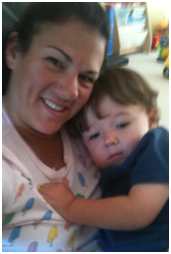
“My little trooper,” is what Samantha Pacelli calls her son, Luca.
“I call him my ‘Little Trooper’ because he is my rock, my world, and has taught us to fight through whatever we face with strength, courage, and faith,” Pacelli said.
Luca Pacelli was diagnosed shortly after birth with a rare brain condition, called hydrocephalus.
“Hydrocephalus is a lifelong brain condition where cerebral fluid builds up in the brain, typically in young children, enlarging the head and sometimes causing brain damage,” said Pacelli.
1 in 500 newborns are born with this brain condition.
Luca underwent two brain surgeries only weeks after birth, including endoscopic third ventricolostomy surgery and a VP shunt placement, his mother said.While Luca was undergoing surgery, Pacelli looked for support groups to reach out to in Connecticut and found none.
“I look back at this horrible time in our lives and realized I didn’t have a clue as to what the doctors were diagnosing my son with,” said Pacelli. “I didn’t realize this would be a lifelong condition. I looked for support groups in Connecticut and there was not one.”
Many other families have faced the same struggle as the Pacelli’s does, and when searching for support groups, have come up short as well.
Pacelli, now Connecticut state director of the PediatricHydrocephalus Foundation, has worked hard to change this.
Pacelli aims to support and console other families dealing with hydrocephalus. She works at educating these families on their child’s condition.As a part of her work to support families with hydrocephalus, Pacelli organized the First Annual PHF Golf Tournament.
Pacelli is holding the PHF Golf Tournament to raise awareness and raise money towards research for curing hydrocephalus.
“You never know when your kids going to need another brain surgery and that’s what my whole thing is, there has got to be another way,” said Pacelli.
Pacelli is asking for “In Kind” donations and sponsors. Sponsors include raffle goods, tee and putting sponsors, breakfast sponsor, players, and small monetary donations.
The PHF Connecticut State Chapter First Annual Golf Tournament is being held July 10 at Lyman Orchards Golf Club. It is located in Middlefield, at 70 Lyman Road.
It is $165 per player fee, which includes green fees, cart, luncheon with beer and wine. For non-golfers, there is a luncheon-only option, costing $50 per person.
For more information on registration and sponsorship, contact Pacelli at (203) 710 1031 or at hydrocephhope@aol.com.
All of the proceeds are tax deductible and will be donated towards research on this condition.
Lapeer County family hosts fundraising event for research, awareness of rare brain condition
June 19, 2012 by PHF
Filed under Uncategorized
Comments Off on Lapeer County family hosts fundraising event for research, awareness of rare brain condition
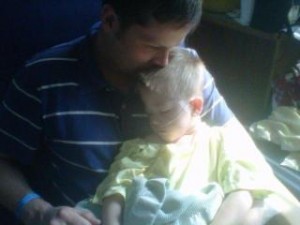
LAPEER COUNTY, MI – Family members say 4-year-old Hawke Adams smiles a lot, has an amazing spirit and is simply an inspiration.
His life, however, almost ended as soon as it started.
Hawke has a rare condition called hydrocephalus, where there is an excessive amount of fluid in the brain. But that’s just a part of his story.
When Carmen Adams of North Branch was pregnant with Hawke and his twin brother, Jackson, surgery had to be done inside the womb because they were sharing blood vessels. That caused some complications with the pregnancy and she had to have an emergency C-section 12 weeks before her due date.
On May 14, 2008, both twins were found dead at birth. Resuscitation attempts to revive both sons began and 12 minutes later Hawke took his first breath. Jackson did not live.
During the resuscitation attempt, however, a hemorrhage formed in Hawke’s brain causing the hydrocephalus, said Jason Adams, Hawke’s father.
“We say God gave him breath,” Jason Adams said. “It was a strange moment, because at that time I was happy, excited and scared at the same time. But we had held our dead son Jackson for 40 minutes. That was a surreal experience, obviously. You’re super excited because your son who was dead is alive but you are still holding your son that is dead.”
Hawkes has had a total of 10 brain surgeries and has spent two of his four birthdays in the hospital.
Jason Adams, as Michigan co-director for the Pediatric Hydrocephalus Foundation, now hopes to focus his attention on raising funds and awareness for the rare condition and research.
On July 27, the Adams family is organizing a fundraiser to raise money for the Foundation. It will take place from 2 p.m. to 7 p.m. at the Lapeer historic courthouse lawn and pavilion, 255 Clay St. in Lapeer.
Beautiful U salon, 232 W. Nepessing St. in Lapeer, will offer haircuts and 70 percent of the proceeds will go toward the foundation. All other donations will go directly to the foundation.
The event will also have events for the whole family, including clowns doing face painting, and obstacle courses.
“It’s an opportunity for people to come out and have some fun with the family,” Jason Adams said.
When Hawke’s mother, Carmen Adams, was first told her son had hydrocephalus, she had never heard of that before, she said. Bringing more awareness to the condition is important, she said.
Hydrocephalus is believed to occur in about 1 in every 500 births. Lack of advancements in treatment have left many people with hydrocephalus unable to lead full and productive lives, according to the Pediactric Hydrocephalus Foundation’s website, www.hydrocephaluskids.org.
Individuals with hydrocephalus need shunts put in to drain the excess fluid, Jason Adams said, but they could break every couple of years, requiring another surgery.
Seven of Hawke’s 10 brain surgeries have been to fix something with his shunt, but living with hydrocephalus is just a way of life for Hawke now, said Carmen Adams.
She said wishes she was more educated from the start. She hopes the event will help others.
“I know Hawke is a miracle. (The expectations) were really grim. (Doctors) weren’t sure if he could swallow or eat … but he eats on his own. Boy, are we thankful for all that he can do,” Carmen Adams said. “They didn’t think Hawke would walk and a whole bunch of stuff. Not having a heart rate for 12 minutes all stacked against him.”
Hawke celebrated his fourth birthday last month and his parents said he is progressing every day.
He acts like any other kid, said Jason Adams, with the exception that he can’t walk on his own and he’s delayed in some fine motor skills. His speech is improving all the time and he does walk with a walker, he said.
“It’s pretty exciting. He could have been a vegetable. … He smiles a lot. He has an amazing spirit,” Jason Adams said.
Rootstown girl chosen as national face of incurable brain condition
April 20, 2012 by PHF
Filed under Uncategorized
ROOTSTOWN TWP.: It’s not immediately obvious what national group would ask Mackenzie Holcomb to be “the face” of its new awareness campaign.
Maybe the “I Love To Shop” preteen movement. Or “Spunky 11-Year-Olds Unite!” Or even “Operation: Spring Dance? I’m So There.” But the Pediatric Hydrocephalus Foundation? Not a chance. And yet … Hidden below her skin is a tube that runs half the length of her body, carrying excess spinal fluid from her brain to her stomach. Her outgoing personality and unfettered smile belie the fact she has undergone six brain surgeries in four years. “It doesn’t stop me from doing anything,” Mackenzie said, though she acknowledges walking more carefully to avoid potential falls. Mom admits to worrying enough for the two of them. “I worry from the time she walks out that door till the time she’s home,” Amy Gyure said of her only child. “And with her getting older and wanting to do more things …” Mackenzie playfully interrupted: “Hey, I’m getting a life!” For the next year, that life will include her photo in ads, media interviews and chatter on social media sites on behalf of the Pediatric Hydrocephalus Foundation, which chose Mackenzie’s name at random, along with 2-year-old Jaden Brown of Colorado, to represent the boys and girls who share an incurable condition. Creating awareness Hydrocephalus is more commonly known as “water on the brain.” Even so, there are probably few nonsufferers who know what that means. That’s the point of the first “National Face of Hydrocephalus Awareness” campaign, spokesman Michael Illions said. “Our hope is to shed some light on this condition and the struggles children and adults have as they face the constant threat of surgery,” Illions said. Mackenzie unwillingly joined their number — 1 million in America — when she was 8 years old. Her parents had noticed tremors in her hands. Doctors found two gliomas, or brain tumors, on her brainstem and her left optic nerve. The one on the brainstem had caused hydrocephalus, meaning it had stopped excess spinal fluid from making its normal exit through the brainstem. In babies with soft skulls, the fluid can build up and cause large deformations. In older children, like Mackenzie, the skull stays put and the pressure builds within. To release the fluid, Mackenzie had a tube inserted into her brain through a hole drilled in the skull. The tube was fed beneath the skin down the back of her head and neck, past her chest and into her stomach. For some lucky folks, the drama ends there. Others face a lifetime of surgeries to repeatedly clean out the tube. So far, Mackenzie has made that trip five times. Severe headaches, vomiting or mild delirium are signs that alert her parents to trouble. Ask about her many surgeries and Mackenzie shrugs. No big deal. She’s used to it, she will tell you. But her mom and her dad, Gary Holcomb, remember those moments a bit differently. They usually were preceded by tears and repeated questions of “why me?” Her parents could offer no answer. “You go from having a perfectly healthy child and all of a sudden, you have neurologists and surgeons and cancer doctors,” Gyure said. “Cancer doctors?” Mackenzie said, stopping her mother. “I have cancer?” “You have two tumors,” Gyure told her. “That’s what a tumor is?” Mackenzie asked as her mom nodded. “Well, I guess I still have a lot to learn.” The tumors are being watched closely, Gyure said, but “they don’t want to mess with them.” Winning the competition At least for now, Mackenzie’s illness will offer a more positive distraction. She didn’t even know her mom had entered her into the competition, and frankly, Gyure figured it was such a long shot, she barely gave it another thought after submitting the entry. When the foundation called to say Mackenzie’s name was chosen from a pool of 160 children, “it was like winning the lottery,” Gyure said. On a national level, the campaign mostly will take place on the Internet, through websites and social media, Illions said. The stories of Mackenzie and Jaden also will be used when the foundation visits Washington, D.C., to meet with congressional representatives who approved September as Hydrocephalus Awareness Month. Meanwhile, the pair will be featured in print ads in their home states. In return, Mackenzie and Jaden will be treated to a professional photo session and have $500 donated in each their names to a hospital of their choice for hydrocephalus research. Gary Holcomb said he hopes awareness will help raise money for new research. “They’ve been doing the same treatment since the 1960s,” he said. Whatever the treatment, it is something Mackenzie will never escape. “This is a life deal,” Gyure said, “but hopefully she will have a long, normal life.”
 Read more at: https://html.com/attributes/img-width/>
Read more at: https://html.com/attributes/img-width/>






















